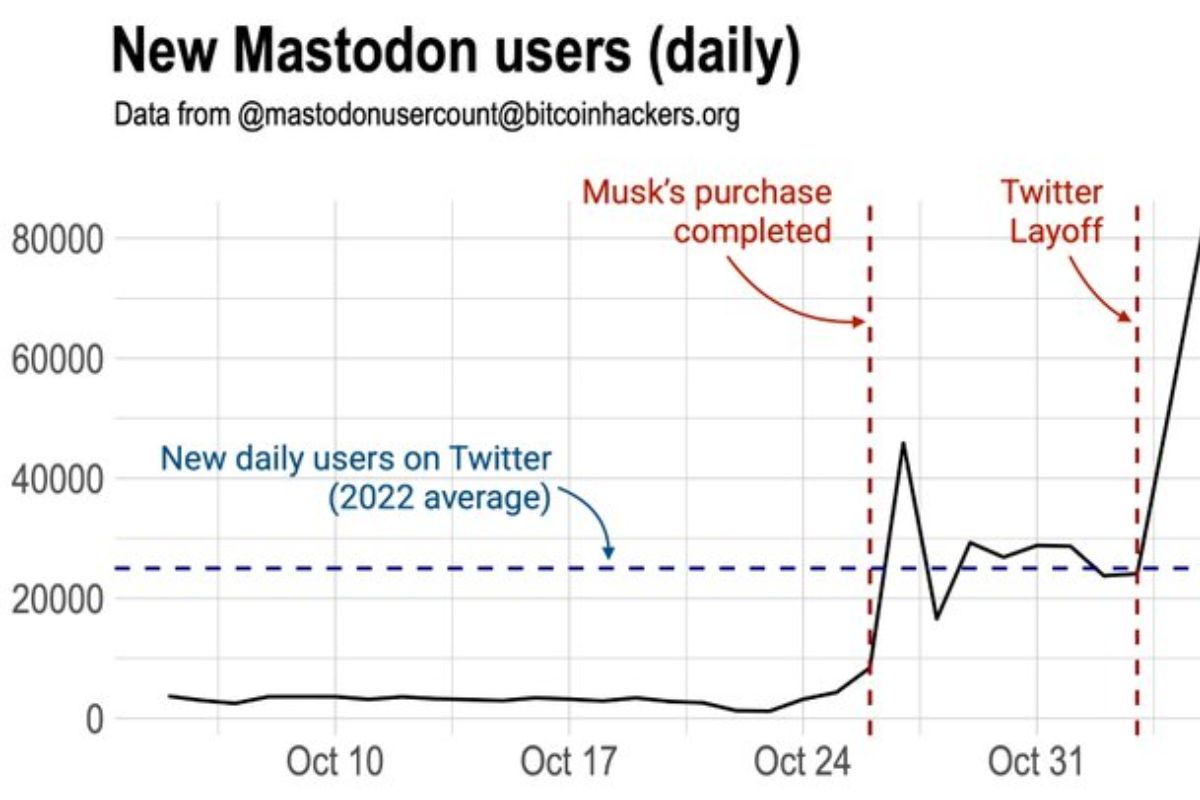A new report makes it easier to see how Twitter users’ lives change as both new and old social media platforms try to get their attention. The trend is called #TwitterMigration, which is a hashtag for people leaving Twitter for other online communities.
Twitter has always been chaotic, but it’s been even worse since Elon Musk took over. Since Musk closed the $44 billion deal to buy the Bird app, he has shared conspiracy theories, antisemitic speech has spread quickly, and users will soon have to pay $8 to be verified on the platform.
People who don’t like what he’s doing either keep their accounts and make new profiles elsewhere or switch to other social networks to share their thoughts.
A political consulting firm called Dewey Square Group released a Friday report saying that the movement shows no signs of stopping.
“Where Are People Going If They Are Leaving?”
Tim Chambers, a principal and project lead at Dewey Digital, the media arm of Dewey Square Group, told Insider that his team wanted to find out what exactly is causing the exodus.

“When I saw the recent events with Elon Musk‘s purchase and the chaos on Twitter, it was really important for us to see if people are leaving and where they are going.” Chambers told us.
Chambers’ team used Twitter data to come to their conclusions. They looked at people who added other social media accounts to their Twitter bios, tweets from people asking people to follow them on other social media platforms, and app downloads from October 24 to November 22.
The group found that Mastodon, an app whose website describes it as “social networking that isn’t for sale,” adds about 1.5 million new users every month. Since Musk took over, more than 90,000 Twitter users have added their Mastodon account names to their bios, and users have talked about Mastodon nearly 200,000 times in the last 30 days, according to Dewey Digital.
The report said, “This is far more than any other new social platform.”
As epitaphs go, this is a pretty good one for Twitter: it was a place that helped marginalized people all over the world to push back on racism and authoritarianism. ⁰#RIPTwitter #TwitterMigration #GoodByeTwitter https://t.co/gnBh0pJd5E
— Cori Faklaris (Mastodon handle in bio) (@heycori) November 18, 2022
Eugen Rochko, who is from Germany and works as a software developer, made Mastodon in 2016. In an interview with Time Magazine, the 29-year-old said he started coding Mastodon because he didn’t like Twitter. Rochko said, “I was thinking that being able to send short messages to my friends online was very important to me and also very important to the world and that maybe it shouldn’t be in the hands of a single company.”
The platform is a decentralized, open-source social network that is free to use. This means that a single server, company, or person does not run it. “It was mostly because people didn’t trust Twitter‘s way of controlling things from the top down,” Rochko said.
On November 6, Rochko tooted, which is Mastodon’s version of tweeting, that the network had reached 1,028,362 monthly active users. The founder said, “That’s pretty cool.” About 237 million people use Twitter every day.
“It just shows how easy it is for everyone to move to another platform.”
Molly Jong-Fast, a podcast host and special correspondent for Vanity Fair, switched to the app in November. When asked how it compares to Twitter, she told Insider, “It’s not as light and easy to use, but it’s 44 billion dollars cheaper.”
“It just shows how simple it is for everyone to switch to a different platform. I think that’s what Mastodon teaches us, “Jong-Fast said.
Jong-Fast has a million Twitter followers, and she said she doesn’t plan to leave the app, but she will if Musk keeps going in the same direction. In the days after Musk officially took over, online trolls sent out more than 50,000 tweets that used the “N-word” and other forms of hate speech.
Jong-Fast said, “I’d rather not help bad causes, so as soon as there’s a good alternative, I’ll go there.”
Adam Davidson, a writer and journalist, has had Mastodon for four years, but he only started using it regularly in the last few weeks. He told Insider that Twitter made him act badly and wanted to try out other social networks. He said, “Twitter is all about making money from engagement.” “And I feel like this [Mastodon] is all about talking.”
Davidson made a Mastodon server for journalists only. The server already has more than 1,000 users, but Davidson is having trouble with it. He told Insider that as soon as he set up the server, 184 trolls joined and started sending hateful messages to the people in the group. As an admin, he was able to stop the people who were saying hateful things from posting by blocking their accounts.
Another problem is that some server administrators have talked to him about not wanting reporters to use the social network to find stories or sources, which is something that often happens on Twitter.
“In the past, there have been a lot of academics and activists on Mastodon, but not many journalists,” said Davidson.
Even though there have been a few problems, Davidson said that Mastodon has a lot of advantages that Twitter doesn’t have. For example, it lets you listen in on conversations between experts without the usual hostility that’s become a part of the bird app.
In a short time, Dewey Digital will do another report. Chambers told Insider that Twitter executives should watch the migration trends.
“I’m keeping a very close eye on it, and I’m sure other teams at Twitter are, too,” Chambers said.
What Do you think about our post? Leave a comment below.
Add this page NogMagazine.com to your bookmark for more related updates.